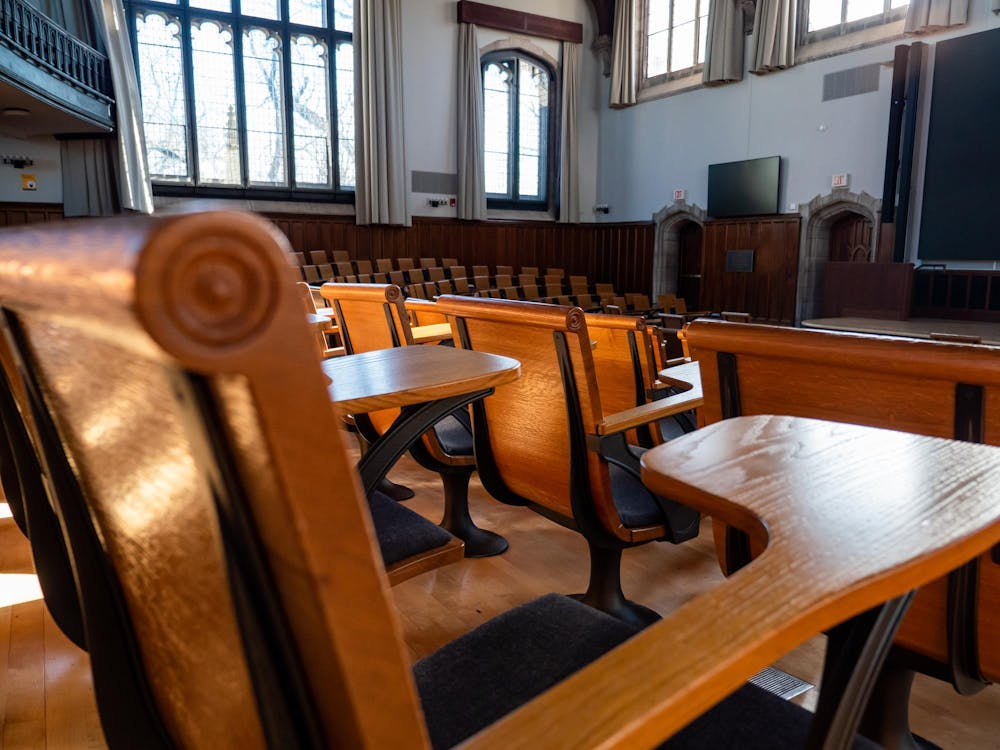To the Editor:
On Dec. 19, The Daily Princetonian published an article entitled “Princeton affirms commitment to DEI after information about several employees shared.” Editor, I am pleased to announce the winner of the illustrious and competitive award: ‘Prince’ article most likely to be found licking the proverbial orange boot.
Runners-up in the news section from just the same week include “Early action decisions released, marking next phase of student body expansion” (in which the University’s lack of transparency was gently described as “refraining from releasing admissions statistics”) and “International students highlight challenges with flying home after finals period” (consider instead: “University schedule makes flying home difficult for international students”). There is a clear pattern of this paper unnecessarily sugarcoating the University’s actions in its coverage, especially in its News section, as evidenced by the piece about the Office of Diversity and Inclusion (ODI). As the record of paper at Princeton, the ‘Prince’ has a responsibility to focus on the humanity of a story and hold powers affecting the community — such as the University — accountable for their actions.
The greatest fault of the article about the ODI is that it misrepresented the effect of right-wing writer Christopher Rufo’s actions, downplaying the harm he caused as “sharing.” This particular headline did not even attempt to describe the doxxing of staff at the ODI, instead making Princeton the hero in what has been an exhausting and stressful experience for those affected.
The Office of Ethics at UC Berkeley writes that “Doxxing refers to the collection of a user’s private information, across multiple platforms (including social media) by an unauthorized individual, who then publishes the information in an attempt to shame or embarrass the user. Doxxing may be conducted by researching public databases, hacking, or through social engineering.” Here it is clear that information “shared” in doxxing can previously have been public (in this case, the personal information was pulled from a public University website). Also, the attempt to shame or embarrass is evident in Rufo’s language from his post: “Imagine this department governing what you can think, say, and do.” The resulting shaming is also clear, with the staff members being called a “cesspool of wokeness,” “insufferable,” and “useless” in replies to Rufo.
The ‘Prince’ noted that they could not get a hold of the staff members who Rufo doxxed. The article says that staff “did not respond to requests for comment from the ‘Prince.’” This wording suggests that the staff were reached out to via email. Meanwhile, the location of the ODI is about a ten minute walk from the ‘Prince’ newsroom.
When I was in the building containing the ODI the other day, a staff member of the Gender + Sexuality Resource Center (GSRC) volunteered information to me about the distress they have had to endure due to the doxxing. I imagine they would have been open to speaking to the ‘Prince’ as well, if the ‘Prince’ had reached them. It is true that I was not some unfamiliar reporter — I was a student who had interacted with the GSRC over the past four years — I had built a working relationship with this staff member, though I was not asking for an article. However, a student reporter can and should have the very same level of familiarity with important sources on campus. Building relationships with sources is a well-known skill for reporting thoroughly on different parts of a community.
Furthermore, it is important to note the passive voice in the headline. The ‘Prince’ refused to assign blame for the “sharing” of information. This is also a story about how conservative reactionaries (not an “activist” as the ‘Prince’ described Christopher Rufo) weaponize resources for young adults on college campuses in their culture wars, which now have frontlines in state legislatures. Journalists are supposed to speak truth to power, not let power be abused, whether by so-called activists such as Rufo or institutions such as the University. Activists and journalists have criticized major news publications time and time again for using passive voice to avoid assigning blame to police officers for the extrajudicial killings of Black people and to nations waging inhumane wars like Israel is doing in Gaza.

The “affirmation” of DEI mentioned in the headline refers to a line in an email sent from Vice Provost Michele Minter to the ‘Prince,’ not to any statement to the public or even to the campus community, and not one from a higher up member of the administration such as a dean or vice president, because such a statement does not exist. The University is treating this issue as an internal matter, despite its highly external nature, without notice to the communities that these staff serve or a public affirmation of the staff members’ work. Because the University will not do so, I urge you to reach out to any staff members of the ODI who have made a positive impact on your campus experience to express your thanks and solidarity.
The University needs to do better about publicly expressing support for and solidarity with its staff, yes, but this is not even a story about the institution. The University did not need to be centered in this article. The community of this paper is the people of the University, not the institution itself.
What this is — and what the record of paper at this University should have written — is a story about the individuals affected by this doxxing, beginning with naming it as doxxing, not the absurd and obvious euphemism of “sharing their information.”
I am not calling out by name any particular reporter, because the ‘Prince’ failed as an institution. As the next managing board takes over in January, I hope they live up to the imperative for a student newspaper to keep the University accountable, rather than resign to simply serve as its mouthpiece.

Mollika Jai Singh is a former associate Opinion editor and former co-DEIB director at the ‘Prince.’ She is a staff writer for The Nassau Weekly and can be reached at mjsingh@princeton.edu.








